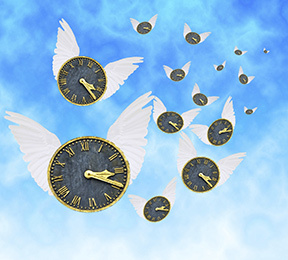Last week was a blur. I don't remember any of it and found myself asking "Is it Sunday again already?" As a mom, watching my daughter's toddlerhood sometimes seems like trying to hold sand in my hands -- slipping through my fingers despite my attempts to grasp it.
I hate that feeling. What if, instead of killing time, we could make it?
Of course we can't physically stop the clock. But former Olympic speed skater and time expert John Coyle argues that the sensation of time flying by is a result of our own behaviors, not that of the clock (listen to my Sharecare Radio interview with him here). When we were children, we didn't feel this way; we had all the time in the world. Back then everything was still new -- from experiences to the new and intense emotions that came with them. From the exhilaration of seeing the ocean for the first time, to learning to ride a bike (with spills at first, but then the thrill of success), our brains absorbed every new lesson and feeling into a rich tapestry of memories. However, as adults, much less is new. We follow routines, try to minimize surprises, and often just run on autopilot. As Coyle explains, that's exactly why time seems to race by.
To combat that feeling, Coyle says we must combine new experiences and emotion. Research confirms this. In fact, having more emotional intensity in our experiences enriches our memories. Erik Feingold, Chief Innovation Officer at Sharecare (and creator of technologies that analyze emotions, relationships and stress), says "Our memory works by associating events with their emotional context. The quality of the emotional context determines the depth of a memory's details."
I'm not recommending you pull a Ferris Bueller -- we all still have to keep up routines and responsibilities. But Coyle suggests leaving the door open for new experiences and the uncertain (and sometimes intense) feelings that accompany them. Here are a few ways to start:
1. Try something you never ever thought you'd do and put some skin in the game. Are you a runner? Sign up and run a 5K -- perhaps one in which a charity is depending on your finishing. Are you the extrovert in the family? Or the funny one? Sign up for an improv class or join a community theater. Play tennis? Join a local competitive league. These commitments don't just increase your chance of meeting a goal; they also push you out of your comfort zone and create the risk of a misstep. Say yes to an activity that you feel unsure about or that scares you. The risk won't just push you harder; it'll also create a far more memorable experience.
2. Create a story by finding adventure. Our brain is hard-wired for stories, Coyle says. So break out of autopilot and the urge to plan everything. Leave room for the unexpected. Coyle tells of a trip with his daughter, where an unplanned hike led to their most memorable experiences of the trip. Recently, my own family had planned to go apple picking, but the day was rainy and chilly, our daughter hadn't slept well and needed to nap, and I needed to run some errands. But my husband pushed for us to still go - so we did. The rain cleared. My daughter and I giggled uncontrollably as pygmy goats at the petting zoo tried to eat her shirt. We stumbled onto a swimming pig race, where we all cheered, "Go pigs!" and supplemented our lunch with caramel apples. It was a messy adventure, and it was absolutely perfect. Every so often take the "Ah heck, why not?" option. Say yes to the occasional adventure.
3. Get into the flow. When you're "in the zone" your brain is 100% engaged, absorbing every detail of what you're doing, which Coyle says is the exact opposite of living numbly on autopilot. Where do you excel and find yourself in the flow? I find my "zone" when I'm spending time with my daughter, caring for the most critical patients in the ER and in my media work. When I'm doing these things, the rest falls away. But everyone is different. You can find yours anywhere from your paid job, to a side dream project that you work on after the kids are in bed, to outside activities, from painting to singing to volunteering. Connecting with those you love and close friends is also a great way -- anything where you're totally present and immersed in the activity.
Time is precious. We can't make more it, but we can squeeze beautiful, memorable experiences out of every week, every day and stop it from flying by. We've got all the time in the world.
Now it's your turn - tried any of these? Have other tricks? Share them with me @DrDarria on Instagram or Twitter, or Dr. Darria Long Gillespie on Facebook.
This content originally appeared on Sharecare.com.
Check out more articles by Dr. Darria Long Gillespie:
